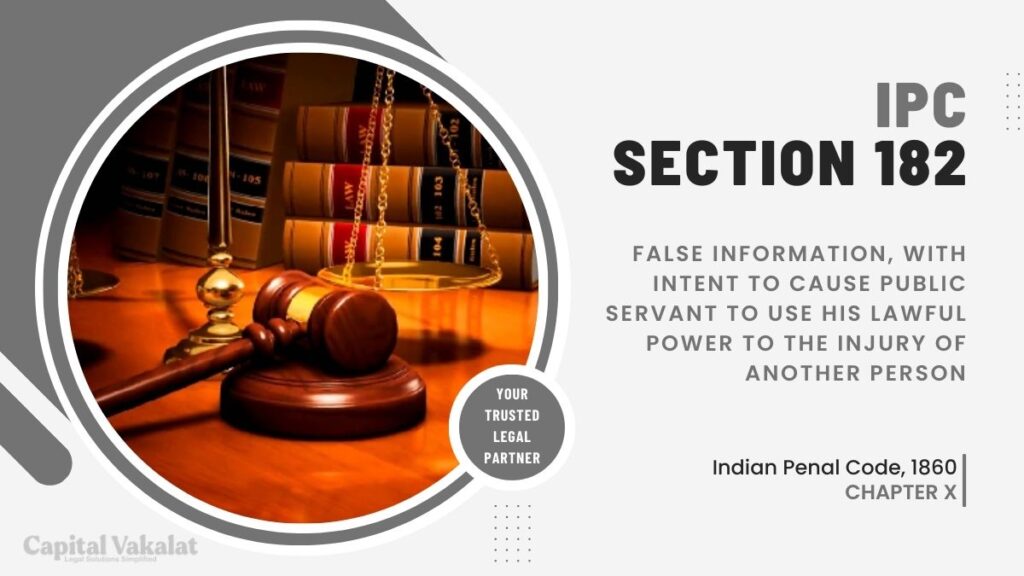In a society governed by laws and regulations, truth and honesty are fundamental. When individuals deliberately provide false information to public servants, it not only undermines the integrity of the legal system but can also have serious consequences.

Section 182 of the Indian Penal Code (IPC) deals with precisely this issue, addressing instances where false information is provided with the intent to cause a public servant to use their lawful power to the injury of another person.
Understanding Section 182 IPC
Section 182 IPC is a legal provision that addresses the act of providing false information to a public servant. To fully comprehend this section, it’s essential to break down its key components:
Elements of False Information
- Intent: The provision requires that false information be provided with intent. This means that the person knowingly and deliberately provides inaccurate details to a public servant.
- Public Servant: The recipient of the false information should be a public servant. Public servants include government employees, police officers, judges, and other officials entrusted with enforcing the law.
- Lawful Power: The false information must be provided with the aim of causing the public servant to use their lawful power. This means that the person intends for the public servant to take legal action based on the false information.
- Injury to Another Person: The false information should have the potential to cause harm or injury to another person. It’s not limited to physical harm but includes any form of detriment or inconvenience.
Punishments for Violation
Section 182 IPC prescribes penalties for those found guilty of providing false information with malicious intent. The punishment may include imprisonment for a term which may extend to six months or a fine, or both.
The Significance of Section 182 IPC
This provision holds great significance in maintaining the credibility of the legal system. It ensures that individuals cannot manipulate the authorities by providing false information to settle personal scores or cause harm to others.
Impact on Society
False information can lead to unnecessary legal proceedings, harassment of innocent individuals, and a waste of public resources. Section 182 IPC acts as a deterrent against such actions and helps maintain law and order.
Real-life Examples
To understand the real-world implications of this legal provision, one can look at cases where false information has been provided to public servants, leading to legal consequences.
For instance, individuals making false claims against someone with the intention of getting them arrested or causing them financial losses can be held accountable under Section 182 IPC.
Challenges in Enforcing Section 182 IPC
While Section 182 IPC serves an important purpose, its enforcement can be challenging. Proving the intent to cause harm, as well as the potential for injury to another person, can be complex.
Reporting False Information
If you come across an instance of false information being provided to a public servant, you can report it to the relevant authorities. This can help in upholding the integrity of the legal system and protecting innocent individuals.
How to Avoid Violating Section 182 IPC
To avoid violating Section 182 IPC, it is crucial to provide accurate information when interacting with public servants. Being truthful and honest is not only a legal requirement but also a fundamental principle of a just society.
Conclusion
Section 182 IPC plays a vital role in upholding the integrity of the legal system by deterring individuals from providing false information with the intent to harm others. It ensures that public servants can carry out their duties without undue interference.
Frequently Asked Questions
Can unintentional false information lead to legal consequences?
Section 182 IPC specifically requires that false information be provided with intent. Unintentional inaccuracies are generally not covered under this provision.
How can one report an instance of false information under Section 182 IPC?
You can report instances of false information to the relevant authorities, such as the police or other law enforcement agencies.
Are there any defenses against false information charges?
Possible defenses may include proving that the information provided was true or that there was no intent to cause harm.
What are the similarities between Section 182 IPC and other legal provisions?
Section 182 IPC is specific to the act of providing false information to public servants. While there may be similarities with other legal provisions, it is distinct in its focus on public servants and their lawful power.